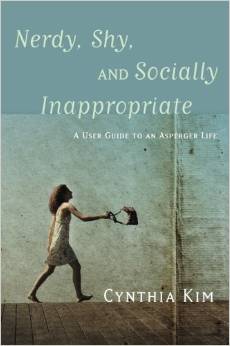 “Nerdy, Shy and Socially Inappropriate: A User Guide to An Asperger Life”
“Nerdy, Shy and Socially Inappropriate: A User Guide to An Asperger Life”
by Cynthia Kim.
‘Nerdy, Shy and Socially Inappropriate: A User Guide to An Asperger Life’ by Cynthia Kim is a frank, honest, and sometimes amusing, book detailing the author’s reflection upon her experiences pre-diagnosis and moving forward after receiving an adult diagnosis of Aspergers’ Syndrome. The book provides tips and advice for fellow ‘Aspies’ on how to cope with certain aspects of life such as; parenting, marriage, social interaction, eye contact and much more. In addition to this, she shares with her readers an eloquent reflection on what it is like to be a female with Asperger’s Syndrome and how to deal with receiving an adult diagnosis.
I feel that before I review this book, I should tell you a little about the author. Cynthia Kim is well-known in the Autistic community for her blog ‘Musing of an Aspie’ (www.musingsofanaspie.com) which details many aspects of Autistic life such as marriage and relationships, parenting, sensory processing, executive functioning and adult ASD diagnosis. Within the biography page of her blog, Cynthia states that she received her diagnosis of Aspergers Syndrome in later adulthood, at the age of 42, at which point she was already married and was raising a daughter. Since her diagnosis, Cynthia Kim has written and published two books; ‘I Think I Might Be Autistic: A Guide to Autism Spectrum Disorder Diagnosis and Self-Discovery for Adults’ and the current book, ‘Nerdy, Shy and Socially Inappropriate’.
Cynthia’s book was certainly eye opening to me, a person without Asperger’s Syndrome, as she had clearly thought hard about how to express how she feels so that non-aspie’s may begin to understand what her life is like. During the memoirs of her childhood, she gives an account how important her alone time was and how forcing children with Asperger’s syndrome to play with other children when they wish to play alone could potentially be very damaging. As someone who wants to venture into special educational needs and someone who comes from a family which is full of neuro-diversity, this account was very interesting to me. Not only did it teach me what a child on the spectrum might be thinking when others may view them as shy and lonely, it opened my eyes to may provisions that could possibly make a child’s school experience more positive (such as quiet time and lunch clubs).
Another section of her book details her marriage and romantic relationship with her husband. Cynthia describes how her ‘neuro-typical’ husband found it very hard to understand her behaviours before she got diagnosed; particularly her bluntness, melt-downs and wanting to avoid social gatherings. I particularly liked reading this section as Cynthia gives many tips for neuro-typical partners and aspie partners on how to come to compromises that work for both of you. One of Cynthia’s compromises is that she’ll go to important family and close friend gatherings with her husband, whilst others her husband will go alone.
In addition to these two sections, Cynthia gives open and honest opinions of her relationships with her parents, colleagues, her daughter, husband whilst talking frankly about her need for order, predictability, feelings of shame, perfectionism and rigidity that can cause huge implications for these relationships. Although her troubles within these relationships were hard to read about (emotionally) it is clear how much Cynthia loves her family and friends to show, perfectly, that it is a complete misconception when people believe those on the spectrum can not feel love or emotion.
With each chapter, Cynthia gives a summary of hints and tips that might help other women in her situation may find useful as she acknowledges that everyone with autism is different. Not only does Cynthia talk frankly about how autism has challenged her, and sometimes made her life unpleasant, she whole heartedly believes in the strengths of having autism (such as having a good sense of humour). I believe that this book would be a great resource for any newly diagnosed woman, particularly those who have families or receive a diagnosis in later life. I would also recommend this book to anyone who has a family member with Autism (particularly females) as it is brilliantly written for everyone.
Anna Stephenson – Assistant Psychologist
Share This Post:






Thank you for this Anna
Just to say we will be giving this book to Autism Inclusive for their library
There are some great books in the library you can borrow
There is no charge for this but donations are welcome !